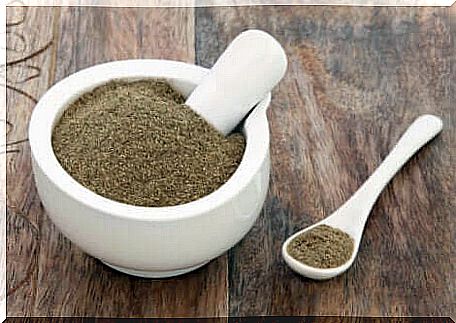Gymnema Sylvestris: Properties And Contraindications
Gymnema Sylvestris is a plant known in Ayurvedic medicine. Due to its composition, it is associated with better metabolic health. In which cases is it recommended? What are its contraindications? Find out!

Gymnema Sylvestris is a woody climbing shrub that belongs to the Apocynaceae family . It comes from the tropical forests of India, Africa and Australia. Its leaves are very famous in the practice of Ayurvedic medicine. Moreover, it is also called gurmar , a Hindi term which translates to “sugar destroyer”.
As detailed in a publication in Journal of Clinical Biochemistry and Nutrition, the plant counts among its components gymnic acids known for their anti-diabetic capacity. In addition, it reduces the risk of heart disease and helps maintain a healthy weight. Do you want to know more about its properties?
Properties of Gymnema Sylvestris
Gymnema Sylvestris supplements have become popular around the world. Thanks to its composition, the plant has aroused an interest in Western medicine. Indeed, it was at the origin of several researches. Thus, although it is not considered a treatment of first choice, its potential as an adjuvant against certain health problems is recognized.
A study published in Frontiers in Pharmacology points out that the plant contains chemicals of great therapeutic importance such as stigmasterol and triterpenoid saponins. They give it, in particular, the following properties:
- Antidiabetics.
- Hypoglycemic.
- Antioxidants.
- Antitumor.
- Antifungals.
- Hepatoprotective.
Benefits of Gymnema Sylvestris
The main bioactive components of Gymnema Sylvestris are gymnic acids. These, in addition to phenolics, saponins and anthraquinones, give it a wide variety of positive health effects. Let’s see the most relevant.

It reduces cravings for sugar
The Gymnema sylvestris has the ability to reduce the urge to eat sugar. According to research published in Physiology & Behavior, gymnic acid helps suppress sweetness by blocking its receptors on the taste buds.
This can be of interest to people who feel a constant urge to consume sugary foods. Therefore, taking extracts of this shrub before meals limits ingestion and makes sugars less attractive.
Gymnema Sylvestris contributes to the regulation of insulin
Without a doubt, one of the most studied topics on Gymnema is its role in conditions such as diabetes and metabolic syndrome. In this regard, a study in Diabetes, Obesity and Metabolism specifies that the plant is an adjuvant in the stimulation of insulin production in the pancreas.
More specifically, its extracts succeed in stimulating the regeneration of the cells of the islets of Langherans, responsible for the production of this hormone. As a result, the glucose level decreases and health is better. However, further research is needed to corroborate this point.
It is effective in controlling blood sugar
It is interesting to note that Gymnema Sylvestris also has anti-diabetic properties. In other words, its consumption promotes the reduction of blood sugar levels. This plant was even used in combination with drugs to enhance their effects.
Moreover, in addition to stimulating the secretion of insulin, it seems that it also helps block receptors in the intestine. This prevents the absorption of glucose. According to a study in Current Pharmaceutical Design, it is necessary to take between 200 and 400 milligrams of gymnic acid to decrease the intestinal absorption of sugar.
However, if you are taking hypoglycemic drugs, it is best to consult a doctor before using these supplements. For now, more studies are needed to assess the effects, as well as the dosage and level of effectiveness.
Anti-inflammatory activity
The tannins and saponins present in the leaves of Gymnema Sylvestris have been valued for their anti-inflammatory activity. For this reason, its extracts are used as adjuvants for diseases associated with inflammation such as diabetes, heart disorders, and autoimmune diseases.
The Gymnema Sylvestris helps weight loss
This is not a miracle cure for losing weight overnight. However, the consumption of Gymnema extracts is associated with a decrease in body mass index.
In a study published in Diabetes, Obesity and Metabolism, people who consumed this supplement experienced a 5% reduction in body weight.
In addition, patients – who were moderately obese – also experienced decreased food intake as well as better control of blood lipid levels.
Help for cardiovascular health
The consumption of extracts of this plant also has a positive impact on cardiovascular health. To be more exact, they are useful in regulating the lipid profile.
This research in Diabetes, Obesity and Metabolism reveals that Gymnema is helpful in lowering triglycerides and bad cholesterol (LDL) in obese patients. We therefore believe that it reduces the risk of cardiovascular disease.
Contraindications of Gymnema Sylvestris
For most healthy adults, Gymnema Sylvestris is safe, provided it is consumed in moderation. However, given the lack of evidence about its safety, it is contraindicated in the following cases:
- Period of pregnancy and lactation.
- In children and babies.
- Diabetic patients undergoing treatment (unless authorized by the doctor).
- People who are going to have surgery.
On the other hand, although side effects are rare, they can occur as a result of a sudden drop in blood sugar. It can be:
- Headache.
- Vertigo and lightheadedness.
- Instability.
- Nausea.

How to take Gymnema Sylvestris?
Currently there are supplements of Gymnema Sylvestris in powder, capsules or infusion form. The leaves are also available for making homemade infusions. The recommended dose depends on the presentation chosen and the manufacturer.
But, in general, the dosage is as follows:
- 100 milligram capsules: 3 or 4 times a day.
- A cup of tea twice a day.
- 2 grams of powder or 4 grams if there are no adverse reactions.
Conclusion…
In Ayurvedic medicine, Gymnema Sylvestris is valued for its ability to regulate glucose levels and reduce the risks associated with metabolic syndrome. However, it is not the first choice treatment for diabetes. Indeed, it is important to use it in moderation and under medical supervision.
Finally, even if some studies support its medicinal properties, this plant should not replace conventional treatments. Simply if the doctor authorizes it, it can be a supplement to promote well-being.









